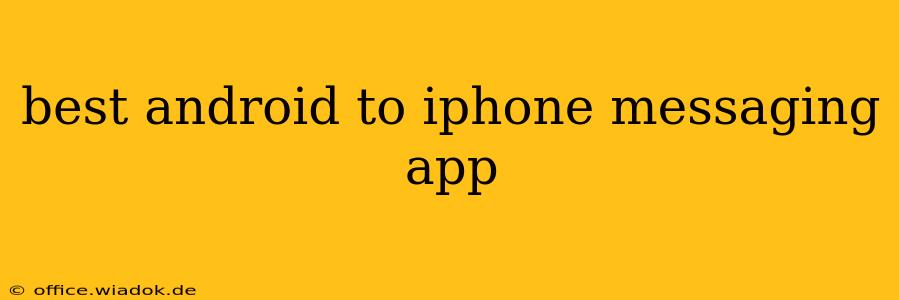Switching from Android to iPhone? Or perhaps you're navigating a relationship or working team where some use Android and others iPhone? Maintaining seamless communication across platforms can be a challenge, but thankfully, several excellent messaging apps bridge the gap. This guide explores the best options, highlighting their features and helping you choose the perfect solution for your needs.
Top Contenders: Messaging Apps for Cross-Platform Communication
The ideal app depends on your priorities. Do you need end-to-end encryption for privacy? Extensive file-sharing capabilities? Seamless integration with other services? Let's examine some top contenders:
1. iMessage: The Apple Ecosystem Favorite (with caveats)
iMessage remains the gold standard for Apple users, offering a rich feature set including read receipts, typing indicators, high-quality image and video sharing, and group chats. However, its cross-platform compatibility is limited. While Android users can receive texts from iMessage users, the experience is significantly downgraded. You'll lose many of the visual features and richer functionalities. Essentially, it becomes a standard SMS/MMS exchange.
Pros: Rich features, seamless within the Apple ecosystem. Cons: Limited cross-platform functionality; Android users get a stripped-down experience.
2. WhatsApp: The Global Leader in Cross-Platform Messaging
WhatsApp boasts a massive user base and excellent cross-platform compatibility. It offers end-to-end encryption, ensuring your conversations remain private. You can share various media types, create group chats, and make voice and video calls. Its simplicity and widespread adoption make it a compelling choice for Android-to-iPhone communication.
Pros: Widely used, end-to-end encrypted, excellent cross-platform compatibility, feature-rich. Cons: Can be cluttered with features for some users.
3. Signal: Privacy-Focused Messaging with Cross-Platform Support
If privacy is your top concern, Signal is an excellent option. It's known for its strong end-to-end encryption and open-source nature, allowing independent verification of its security. It provides a clean, simple interface and supports various media sharing and group chat functionalities. Signal's cross-platform compatibility ensures a consistent experience regardless of the device.
Pros: Robust end-to-end encryption, open-source, clean interface, excellent cross-platform compatibility. Cons: Fewer features than some competitors (some users may find this a pro).
4. Google Messages: A Solid Choice with RCS Support
Google Messages offers a decent cross-platform experience. Its key advantage lies in its support for Rich Communication Services (RCS). RCS enhances standard SMS/MMS, providing features like read receipts and typing indicators – a step up from basic texting, though not as feature-rich as iMessage. While not all carriers or phones support RCS fully, it's steadily improving.
Pros: Widely available, supports RCS for enhanced messaging (where available), integrates well with the Android ecosystem. Cons: RCS adoption isn't universal, so it might not always provide the enhanced features.
Choosing the Right App: Consider Your Needs
The "best" app depends on individual needs and priorities:
- For seamless Apple-to-Apple communication: iMessage (but be aware of limitations with Android users).
- For widespread cross-platform compatibility and a balance of features: WhatsApp.
- For absolute privacy and simplicity: Signal.
- For a solid standard texting alternative with RCS improvements: Google Messages (where RCS is supported).
Remember to consider factors like ease of use, feature set, privacy levels, and the overall experience when making your decision. Try out a few different apps to see which best suits your communication style and needs.

